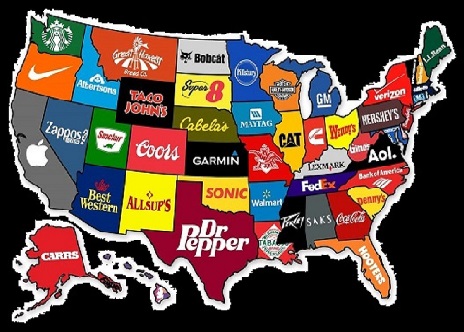
When comparing quality of life conditions between advanced Western capitalist nations and individual states within the U.S., a growing amount of data shows that those which are the most extremely conservative and religious are very often the most violent and plagued with far greater social problems in more than a dozen categories like overall crime, economic mobility, infant mortality, overall poverty, environmental abuse, teen pregnancy, incarceration, life expectancy, murder, education, childhood poverty, healthcare efficiency, “best-for-business” conditions, average worker to CEO pay ratio, paid maternity leave, gun violence, obesity, income inequality and minimal worker’s benefits. Extreme liberalism, such as with revolutionary communism, also seriously detracts from quality of life. This ideology has maintained a very weak following around the world since the late 20th century. Extreme social and economic conservatism, in contrast, has been increasingly popular among a large segment of the American population during the past four decades. Based on the historical record and the data this article provides through over 120 web links, it is clear that the most effective formula toward achieving and maintaining higher quality of life for the average person includes a secular culture with thoroughly regulated capitalist economic systems mixed with a wide range of socialist policies.
Contrary to the repeated slogans of asserted “self-evident truths” within my very conservative upbringing, I have discovered that a broad variety of economic, historical and sociological data reveal that the best answer is a combination of mostly liberalism with limited aspects of conservatism and libertarianism. See in the statistics below sizable evidence of poor performance from the extreme conservatism that has gradually taken over a large portion of the United States since the early 1980s, in contrast to moderate Republican policies like those of Dwight Eisenhower, Richard Nixon and Gerald Ford. The party has gone so far to the right in such uncompromising and dogmatic ways that many of Ronald Reagan’s policies and virtually all of his occasional compromises with Democrats in Congress during the 1980s would not be possible today. The damage that extreme liberalism inevitably brings is not the political challenge facing us today because the world has been moving increasingly further away from it since at least the late 20th century. Much of what contemporary Republicans consider to be liberal or even socialistic in the typical 21st century Democrat is moderate by global standards and was basically normative for both parties in the United States during the 1950s-70s. For example, the policies and values of the pro-business Conservative Party in Britain, arguably one of the least liberal major political groups in Western Europe, is much like our Democratic Party.
Since the end of World War II, the United States has performed far better in major economic categories when Democratic presidents have been in office: job growth, GDP growth, business investment growth, recessions, unemployment, growth in pay, growth in federal spending, trade deficit, total deficit, and on-budget deficit. Many academic researchers and journalists have demonstrated this fact through referencing official government records. Forbes writer, Jere Glover, has compiled the evidence in an accessible format at presidentialdata.org. It seems evident this pattern has repeatedly happened because Democrats within this era have very imperfectly attempted to use economic policies based on modern theories that utilize what has been learned since the Great Depression. In contrast, Republicans insist on using economic approaches that have more in common with the extreme lack of regulations in the late 1800s when the Robber Barons and extreme income inequality dominated and the kinds of inherently unstable systems that greatly encouraged the financial collapse in 1929. Glover notes, for example, that “ten of the last eleven recessions have occurred under Republican presidents.” The correlations between Republican leadership and poor economic results are too consistent for us to simply dismiss them as not being related to causation in significant ways.
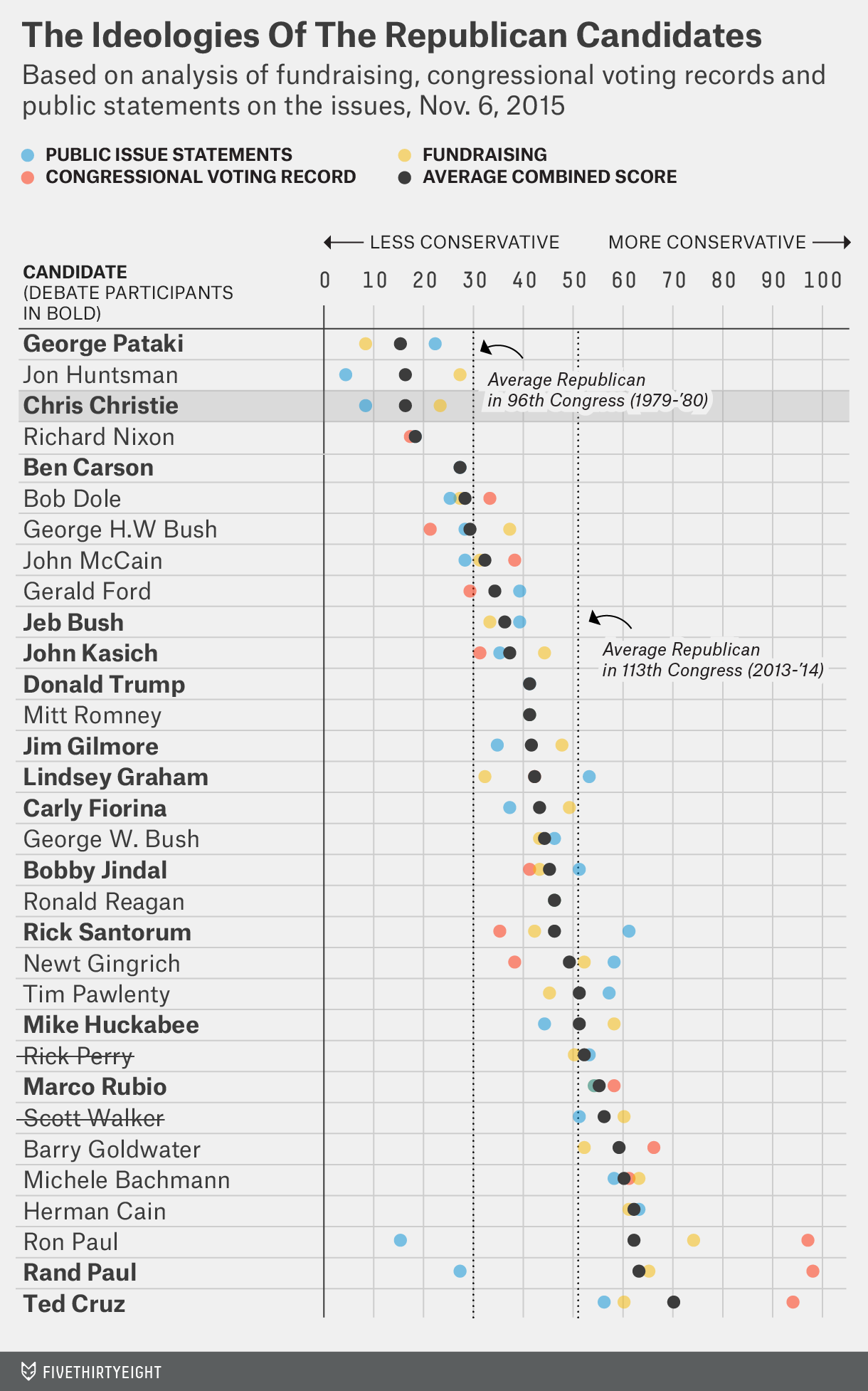
Extreme conservatism significantly drives much of American political and economic life today and America strongly influences much of the world. Among the moods and philosophies of this movement are the long-term effects of a Cold War anti-communism that portrayed any form of socialism as a severe danger or even communism-in-disguise. In reality, socialism and communism are not the same thing. Communism is an extreme form of socialism. Communism involves total control of a society by a government. Forms of extreme socialism have often been very oppressive and authoritarian, such as with state communism in the USSR and market communism in today’s China. Types of socialism such as democratic socialism and social democracy include the right to private property and regulated capitalism. Though many Americans describe several Northern and Western European nations as socialist, they are actually capitalist societies with greater investment in social welfare programs and monetary regulations than that of the United States.
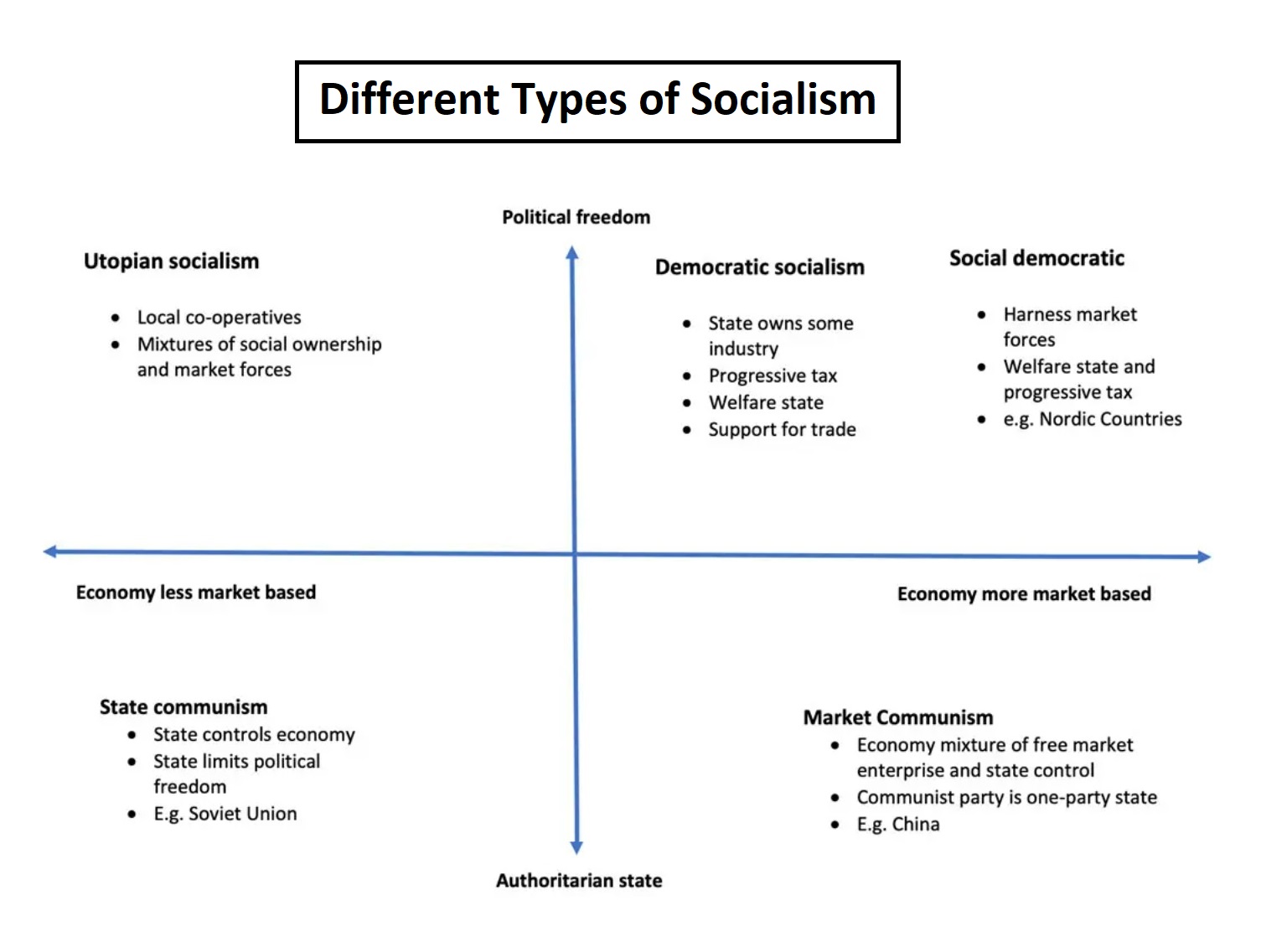
Socialism became a dirty word, and somewhat understandably so since the brutal totalitarian regime that led Eastern Europe and Russia during much of the 20th century was called the Union of Soviet Socialist Republics. Communist nations of the 21st century have been less murderous and restrictive than in the 20th. But, like in the track record of virtually all empires before them for thousands of years in nearly every major region on Earth, all communist governments in history so far have thoroughly and self-righteously embraced terribly inhumane methods such as autocracy, exploitation, inequality, violence, indoctrination, political domination, intellectual restriction and propaganda centered on blatant falsehoods. It is vital to note that capitalist nations have sometimes participated in those negative behaviors as well, but typically in less severe ways because there has often been an attempt to practice democracy and protect universal human rights. Capitalism has been especially harmful to societies when unregulated, as this had led to environmental destruction, extreme income inequality, higher unemployment, or severe economic instability through more common market crashes/recessions/depressions. The term “republic” was not equally tarnished because many republics in the past hundred years were not systematically oppressive, consistently barbarous and dehumanizing – most of the time. At least in a large number of republics, there has been a gradual transition in the direction of more humane governmental practices.
Several generations of mainstream Americans have considered socialism inherently destined to fail in any context, yet today every nation in the world maintains, in widely varying degrees, an economic system of integrated socialism and capitalism. Otherwise known as mixed economies, they combine aspects of a free market with elements from a command economy. This includes the five remaining communist countries originally and deeply influenced by Russia, a society that has made many adjustments in recent decades so that various forms of capitalism might continue to grow: Vietnam, China, Laos, Cuba and North Korea. The fact that the United States and Britain (often the most conservative and religious Western European country) rank so badly among highly developed capitalist nations regarding social ills ought to inspire self-reflection in the face of the empty American proverbs from right wing sources declaring that all forms of socialism and secularism are automatically and regularly destroyers of life and human flourishing. One can easily point to a vast amount of destruction that capitalism has brought upon human bodies through the exploitation of workers, on the ecosystem by pollution, and to the economy during stock market crashes. If we critique capitalism honestly and comprehensively, however, many astounding and practical benefits that come from it can become visible. Examples of this include rising living standards globally over time, innovation through competition and financial incentives for people to take creative risks in the economy. Just as in sports, where there are rules, referees, and ideals of good sportsmanship, the majority of modern leaders around the world recognize the need for significant regulations that will limit the excesses and abuses that have occurred when capitalism has been nearly unrestricted in many directions. The negative sides of capitalism and socialism can be largely kept in check if they are implemented in ways that require them to work together toward unleashing their strengths while simultaneously correcting for each other’s substantial limitations.
When I use the description “advanced Western capitalist nations”, I am referring to these kinds of societies: Norway, France, United States, Denmark, Australia, Switzerland, Netherlands, Belgium, Sweden, United Kingdom, Canada, New Zealand, Finland, Germany and Sweden. In comparison to the United States, all of the other countries listed above far more comfortably engage the use of liberal policies such as universal social programs and more systematic regulations to protect themselves and the environment from the common excesses, inherent instability and periodic destructiveness of capitalism, while harnessing its many positive qualities to produce innovation and prosperity.
Americans especially need to know and admit that socialism and capitalism work very well together. Each country will decide on a different specific format and ratio between the two elements (50/50, 70/30, 40/60, etc.), but citizens need not fear either big business or government – as long as both are integrated and regulated in effective and reasonable ways.
The same general observation of the intrinsic destructiveness of extremist beliefs can be discovered on the spectrum between types of secularism and religion (conservative and liberal). As is demonstrated in the data below, the highly developed nations and individual American states that are more secular and moderately liberal tend to have far lower levels of social ills. Why? Causation is always very difficult to pinpoint or prove in history and sociology, but robust (and especially interdisciplinary) correlative data found to encompass long periods of time in various scenarios and contexts are worth taking seriously. If the same basic philosophies and types of policies are dominant in separate societies that achieve very similar results over decades or even centuries, it likely means there is something closer to a true cause and effect relationship.
Consider the links to statistics below. I have found these examples to be generally representative of the various data sources on each major subject. Many charts are included at the bottom of this article.
On the Quality of Life Index for 2010, the United States ranked 33rd overall, 39th in health, 24th in education, 17th in wealth, 15th in democracy, 77th in peace and 38th in environment.
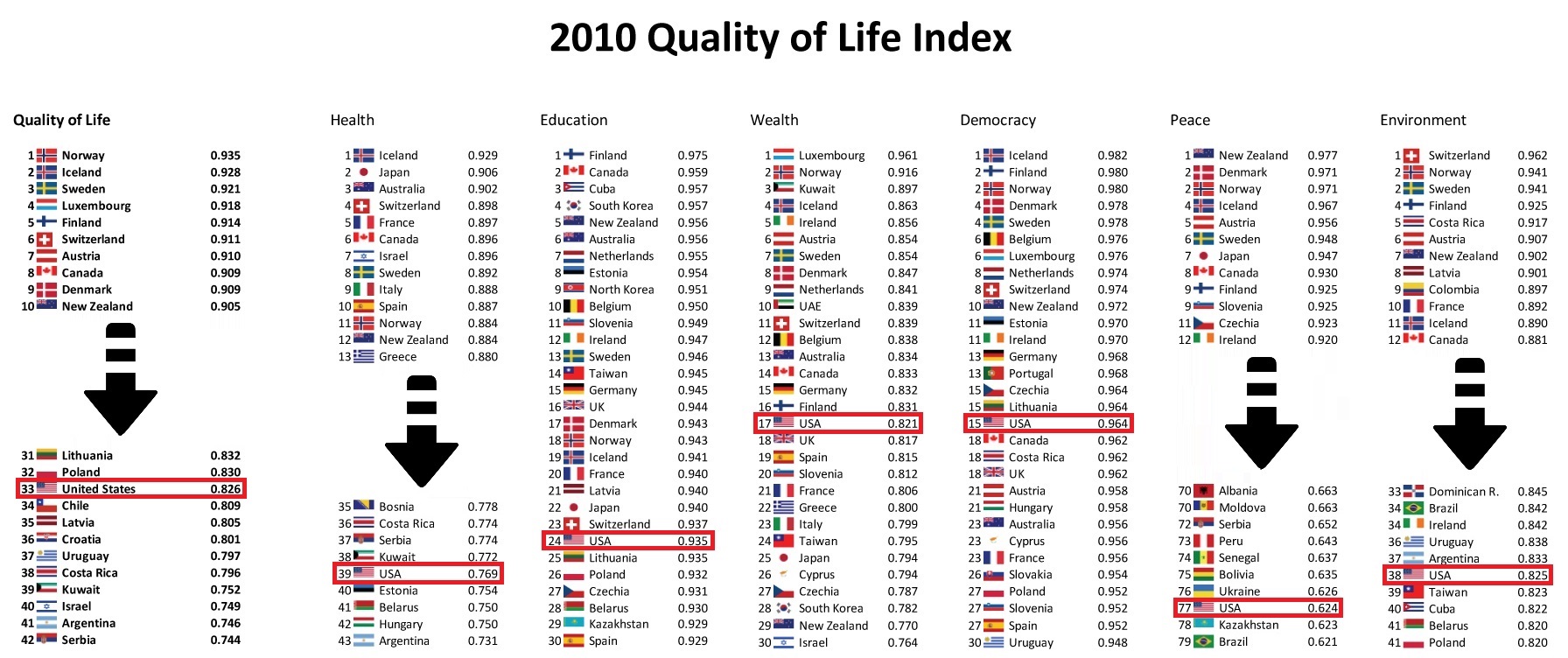
Results from a 2016 study comparing nations on quality of life by U.S. News & World Report ranked America significantly higher, at 14th, better than most but still behind more than a dozen more liberal nations.
American states have been examined and contrasted in ways similar to how the United Nations does with a Human Development Index to find “a composite statistic of life expectancy, education, and income per capita indicators, which are used to rank countries into four tiers of human development”. One analyst describes a study of this kind released in 2014 as being “conducted by Measure of America, a seven-year-old nonpartisan project of the Social Science Research Council, and Opportunity Nation, a nonprofit that promotes policies to expand social mobility — attempt to measure prosperity and opportunity in America today and over the past few decades.” The results generally followed the pattern that repeatedly appears in the paragraphs below – the more extremely conservative states correlate with a lower quality of life. “A Mississippian today lives about as long and earns about as much as the typical American in the late 1980s…The nation’s HDI score, Measure of America’s attempt to track well-being, has more than tripled since 1960 thanks to increases in life expectancy and access to better education and health care. Yet, as the map above shows, there’s wide variation by state….Connecticut led the nation, followed by Massachusetts, New Jersey and Maryland. The states lagging furthest behind are Alabama, Kentucky, West Virginia, Arkansas and Mississippi, where residents have life spans and earnings that the typical American had in the late 1980s. Mississippi’s HDI score is just three fifths that of Connecticut.”
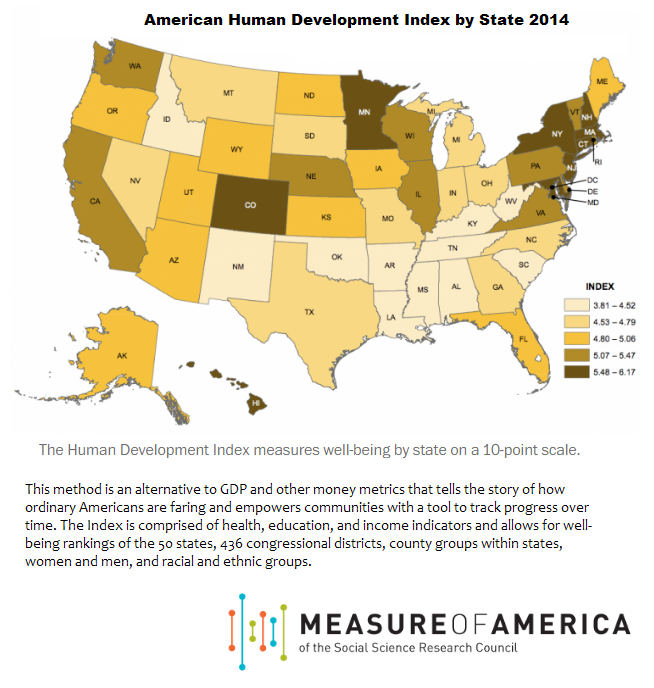
A very large 2014 study by the Organization for Economic Cooperation and Development showed quality of life conditions are very much worse in the conservative Southern states. The 362 regions of the OECD’s 34 member nations were compared in categories of education, income, health, jobs, environment, access to broadband, civic engagement, housing and safety. The top 5 were revealed as New Hampshire (77.6), Minnesota (76.2), Vermont (74.8). Iowa (72.9) and North Dakota (72.4). And the bottom 5 turned out to be Mississippi (50.7), Arkansas (51.3), Alabama (51.3), West Virginia (52.2) and Tennessee (52.9).
When world crime rates from any year in the past few decades are examined, especially in contrast with other well developed countries, America stands in a disastrous condition. The trend is very high by percentage of population (2012-2015), showing a violence rate that surpasses all other advanced nations. Data from 2011 shows that with crime defined as “formal contact with the police and/or criminal justice system [which] may include persons suspected, or arrested or cautioned”, America ranks #1 (12.4 million) by a large margin over Germany (2.1 million), France (1.17 million), Russian Federation (1 million), Italy (900,000) and Canada (600,000). As a general exercise , we can compare that to the absolute numbers in population size for the same year to see a crime pattern: America – 3.97%, Germany – 2.56%, France – 1.79%, Russian Federation – 0.69%, Italy – 1.51%, Canada – 1.74%.
FBI data shows the U.S. crime rate has followed the overall global trend in declining violence, such as how it has fallen by half since the early 1990s. Yet the conservative states have been consistently been less safe.
Research on global murder rates by the United Nations Office on Drugs and Crime pulled from various 2008-2012 statistics and found that the U.S. ranked as the 98th safest out of 218 nations. The rate is 3.8. Consider that nations with much less technological sophistication, educational opportunities, economic power and other advances of modernity are safer to live in, such as Indonesia (0.6), Algeria (0.7), Nepal (2.9), Bangladesh (2.7), Libya (1.7), Chile (3.1), Taiwan (3.0), Jordan (2.0) and Bahrain (0.5). The rates of homicide in other advanced societies are virtually all much less than half that of the United States, such as Canada (1.6), Australia (1.1), Italy (0.9), New Zealand (0.9), Japan (0.3), Israel (1.8) and Germany (0.8).
Murder by firearm rates are far higher in America than all other advanced nations – note that gun ownership rates are significantly higher here.
Murder by firearm rates are generally far higher in conservative American states – note that gun ownership rates are significantly higher here.
Healthcare efficiency in America was ranked 48th in 2008, 46th in 2012, 44th in 2014 and 50th in 2015 through studies by Bloomberg. It has been a long term problem, as evidenced by our 38th position in a comparison study by the World Health Organization in 2000. The Huffington Post remarked about the 2012 numbers, “It’s remarkable how low America places in health care efficiency: among the 48 countries included in the Bloomberg study, the U.S. ranks 46th, outpacing just Serbia and Brazil. Once that sinks in, try this one on for size: the U.S. ranks worse than China, Algeria, and Iran.” Even though our system is the most expensive, a 2013 study by a well-respected private healthcare policy organization, the Commonwealth Fund, rated the United States last overall out of 11 total industrialized nations evaluated in categories of “health system quality, efficiency, access to care, equity, and healthy lives”. PBS remarked: “At 17.6% of GDP in 2010, US health spending is one and a half as much as any other country, and nearly twice the OECD average.” And per capita, the “US spends two-and-a-half times the OECD average.” Still, we drastically lag behind the healthcare efficiency level of approximately 1/4th of the societies on Earth, including all other advanced Western capitalist nations.
America’s incarceration rate is the 2nd highest in the world out of 223 countries.
Economic mobility is worse in America than nearly a dozen other advanced Western capitalist nations.
Foreign aid given as a percentage of the national budget is thought to be as high as 28% in the minds of many Americans surveyed and it’s often proposed that this is due to the elements of generosity intrinsic to our conservatism or traditional religious values. Actually, the amount hovers around 0.18%, globally ranking near 20th year after year, far behind more liberal and secular nations like Denmark, Norway, Sweden and Netherlands which spend 4-5 times as much. In measures of private charity, America tends to do very well, though much of that is to local churches and other local groups, not foreign aid. Forbes examined this and found many nuances that don’t always support the claim of American leadership even in the area of private donations, especially since more liberal nations expect to express their charity through taxpayer provided public services more so than individual giving. Another relevant factor is that income inequality is generally much more prevalent in the United States than other advanced nations.
Teen pregnancy rates are far higher in conservative American states.
Teen pregnancy rates are far higher in America than at least twenty other Western countries.
Infant mortality rates are far higher in America than most other industrialized countries. The CIA World Factbook shows we had the 167th highest rate of infant mortality for 2015, out of 224 countries. Our advanced Western peer nations had lower rates.
Infant mortality rates are far higher in conservative American states.
Obesity rates are far higher in America than all other industrialized countries. Research published in 2011 showed that “over one-third of children in the US are overweight or obese”, around 35%, while the OECD average was less than one-fourth, at about 22%. Data compiled in 2012 demonstrated that the national rate for all ages had climbed from 23% in 1990 to 31% in 2000 to 36% in 2010 – an all time high.
Obesity rates are generally much higher in conservative American states.
Guaranteed paid maternity leave is not legally mandated in the US, in contrast to every other developed nation.
Income inequality is much worse in America than other industrialized nations. In 2011, one analyst noted: “A new study from the Congressional Budget Office, for example, found that income of the top 1 percent of households increased by 275 percent in the 30-year period ending in 2007. American households at the bottom and in the middle, meanwhile, saw income growth of just 18 to 40 percent over the same period.”
Income inequality is proportionally higher in more religious countries. A major academic study of 137 countries in 2011 conducted “a multilevel analysis of countries around the world over two decades and a time-series analysis of the United States over a half-century”. The findings were that “economic inequality has a strong positive effect on the religiosity of all members of a society regardless of income”. The researchers concluded that the results “support relative power theory, which maintains that greater inequality yields more religiosity by increasing the degree to which wealthy people are attracted to religion and have the power to shape the attitudes and beliefs of those with fewer means”. Another investigation that same year of those nations discovered that secularity is correlated with “greater existential security, including income security (income equality and redistribution via welfare states) and improved health”. Reviews by Christianity Today of much related academic research found the same trend.
Poverty rates by nation show the United States in a truly lamentable position among the world’s richest nations, 19th in 2010. This is especially unfortunate given that we are by far the wealthiest country in GDP. We ranked at the very bottom, under 22 OECD countries, in a study that examined data covering the late 2000s. Statistics regarding senior citizens from the mid-2000s situate America 18th out of 20 and in 2015 the rate (21.5) was more than 10 times that of the Netherlands (2.0), greater than 5 times as much as France (3.8) and about 3 times the financial destitution that had occurred in Canada (6.7), Spain (6.8), Greece (6.9) and Ireland (6.9).
Poverty rates for most of the 10 most troubled states in this category tend to be much more conservative states. Between 2005 and 2011, high poverty rates spread from their starting position in the central Southern states to reach far beyond that in correlation with the aftereffects of the 2007-2008 financial collapse. When looking at 1990-2010 combined and averaged, it’s clear that conservative states in general are more likely to be stuck in greater poverty.
Childhood poverty is typically and substantially more common in America than its peer nations. UNICEF data from the mid-1990s shows the United States trailing after the other 14 advanced nations compared, more than half of which have between 2 to 7 times lower levels of impoverishment. Later research illustrated the problem continuing, from the late-1990s (UNICEF) placing us 14th out of 15 nations studied and the mid-2000s (OECD) including a 28th position out of 30. We were found to be last out of 26 compared in 2009 and 28th of 31 in 2011. One commentator explained about a 2014 UNICEF report: “Nearly one third of U.S. children live in households with an income below 60 percent of the national median income in 2008 – about $31,000 annually. In the richest nation in the world, one in three kids live in poverty….With 32.2 percent of children living below this line, the U.S. ranks 36th out of the 41 wealthy countries included in the UNICEF report. By contrast, only 5.3 percent of Norwegian kids currently meet this definition of poverty.”
Childhood poverty is at its highest among conservative states. Relevant statistics demonstrated this pattern in 2005, 2009, 2010, 2011 and 2013. In 2009, as an example, the poverty line for a family of two adults and two children was defined by the U.S. Census Bureau as $21,756 in annual income.
Child well-being measurements are quite low in America and the more conservative states when contrasted against their counterparts. This includes health and safety, educational well-being, family and peer relationships, behaviors and risks, material well-being and subjective well-being.
Federal aid and food stamps usage is quite high in many conservative states, places known to staunchly advocate for very limited government dependence.
Life expectancy is worse in America than other industrialized nations.
Life expectancy is lower in conservative American states.
CEO salary compared to average worker pay is much worse in America than in our peer countries.
The number of paid vacation days and paid holidays are much lower in America than other advanced societies.
Secular societies can function quite well.
A widely praised book that highlights success in nations with a secular foundation is Society without God: What the Least Religious Nations Can Tell Us About Contentment by sociologist Phil Zuckerman.
America is often not even close to being the best country for business. For example, when Forbes evaluated which countries were best for business in 2015, Denmark was #1. This was followed by New Zealand, Norway, Ireland, Sweden, Finland and Canada. By a large measure, they obviously do not agree with Tea Party policies of extreme libertarianism, yet no conservative country is near the top of this “pro-business” list. The United States ranks #22. U.S. News & World Report conducted a similar research project in 2016 to find the most “market-oriented countries [that] are a haven for capitalists and corporations”, in which we scored #23 – behind those same types of more liberal advanced Western capitalist societies.
One analysis by a writer for Business Insider and The Atlantic explains the Nordic countries’ very high success in business and quality of life this way:
“Nordic countries are well-ranked when it comes to helping facilitate starting a business. At the most basic level, what the Nordic approach does is reduce the risk of starting a company, since basic services such as education and health care are covered for regardless of the fledgling company’s fate….[If] the entrepreneur succeeds, they are rewarded by tax rates on capital gains that are lower than the rate on wages.”
The link in the quote above references data from the World Bank Group on 189 countries, in which America fares better overall than in the Forbes study just mentioned. Among the top ten performing nations under the criteria for “Ease of Doing Business”, it ranks #7. Noticeably, the United States lags far behind other advanced societies in performance measurements on “Starting a Business” – #49, “Getting Electricity” – #33 and “Trading Across Borders” – #34. See chart:
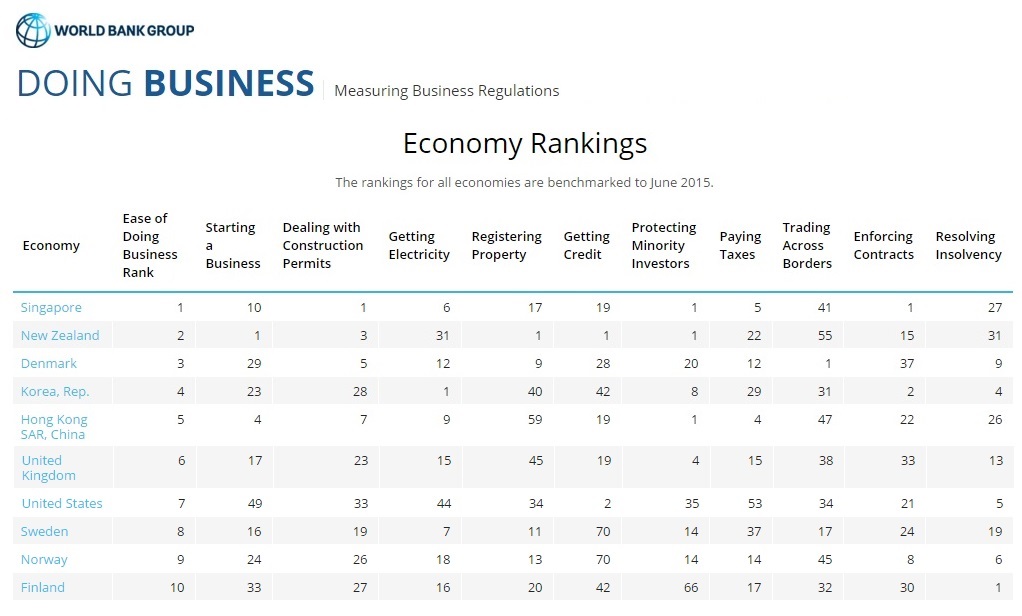
The author is a Finnish immigrant and in that article explores many differences in quality of life between America and Nordic countries (Denmark, Iceland, Finland, Sweden, Norway). He lays out many points that contradict popular criticisms often proposed to disqualify this comparison:
“This is what Americans fail to understand: My taxes in Finland were used to pay for top-notch services for me.”
“Nordic countries are the way they are, I’m told, because they are small, homogeneous ‘nanny states’ where everyone looks alike, thinks alike, and belongs to a big extended family….This, in turn, makes Nordic citizens willing to sacrifice their own interests to help their neighbors. Americans don’t feel a similar kinship with other Americans, I’m told, and thus will never sacrifice their own interests for the common good. What this is mostly taken to mean is that Americans will never, ever agree to pay higher taxes to provide universal social services, as the Nordics do. Thus Bernie Sanders, and anyone else in the U.S. who brings up Nordic countries as an example for America, is living in la-la land….But this vision of homogenous, altruistic Nordic lands is mostly a fantasy. The choices Nordic countries have made have little to do with altruism or kinship. Rather, Nordic people have made their decisions out of self-interest. Nordic nations offer their citizens—all of their citizens, but especially the middle class—high-quality services that save people a lot of money, time, and trouble.”
“Nordics are not only just as selfish as everyone else on this earth but they can—and do—dislike many of their fellow citizens just as much as people with different political views dislike each other in other countries….The reason Nordics stick with the system is because they can see that on the whole, they come out ahead—not just as a group, but as individuals.”
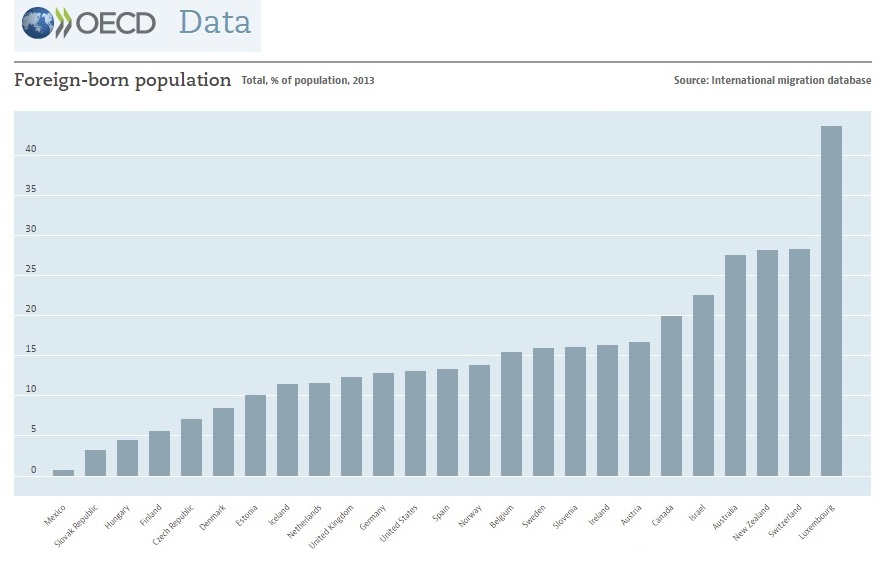

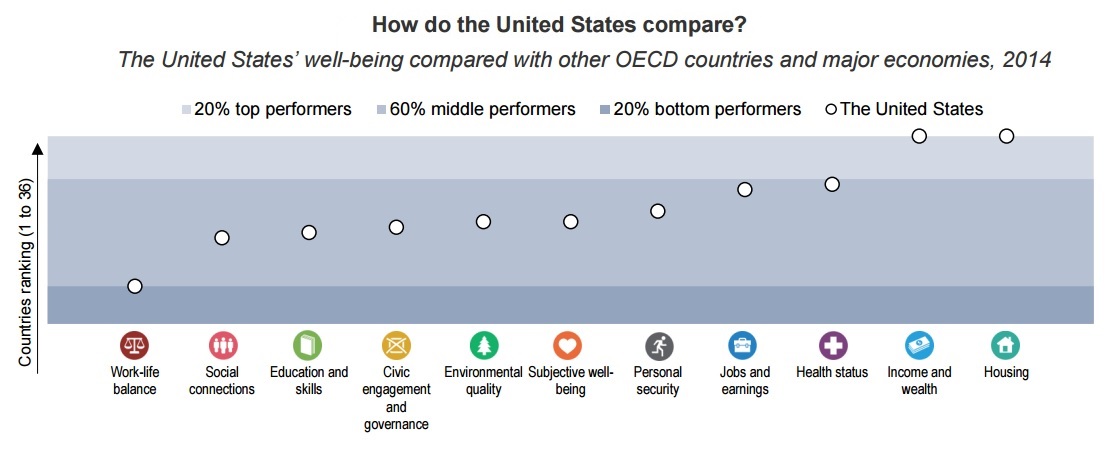

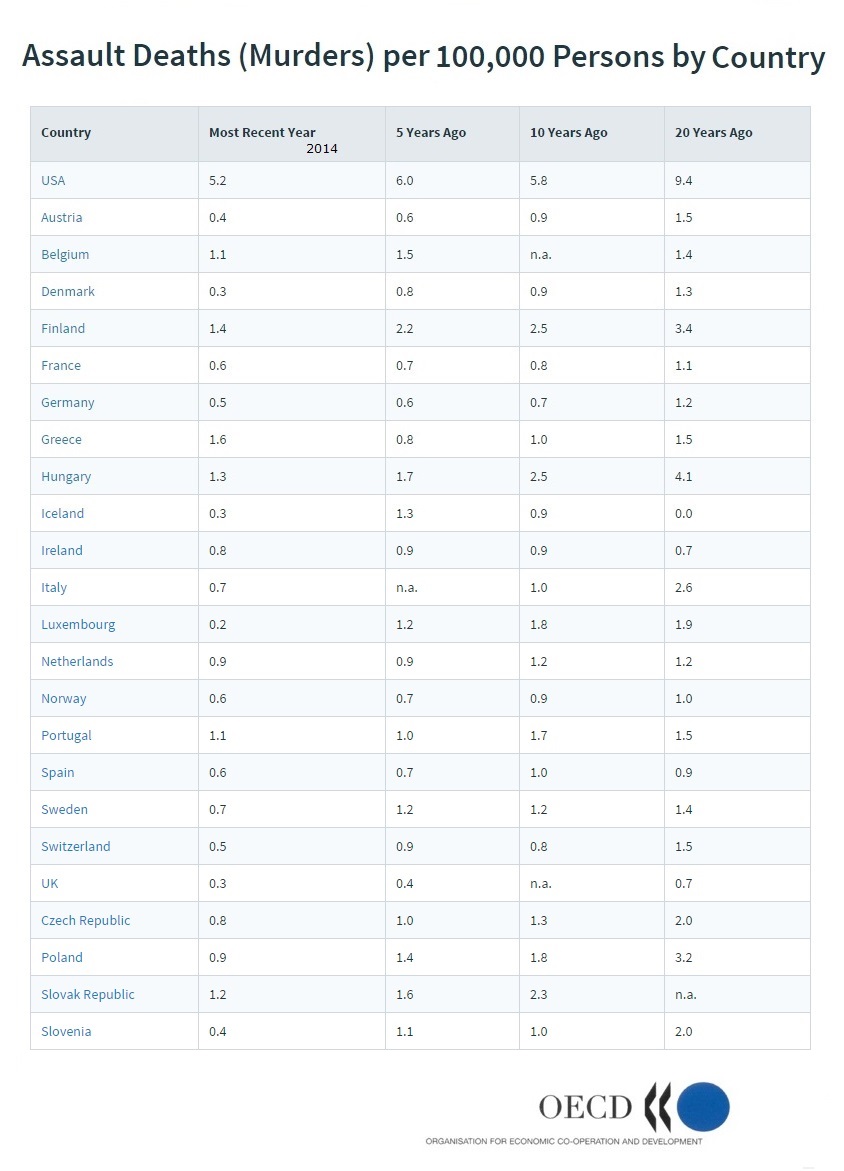


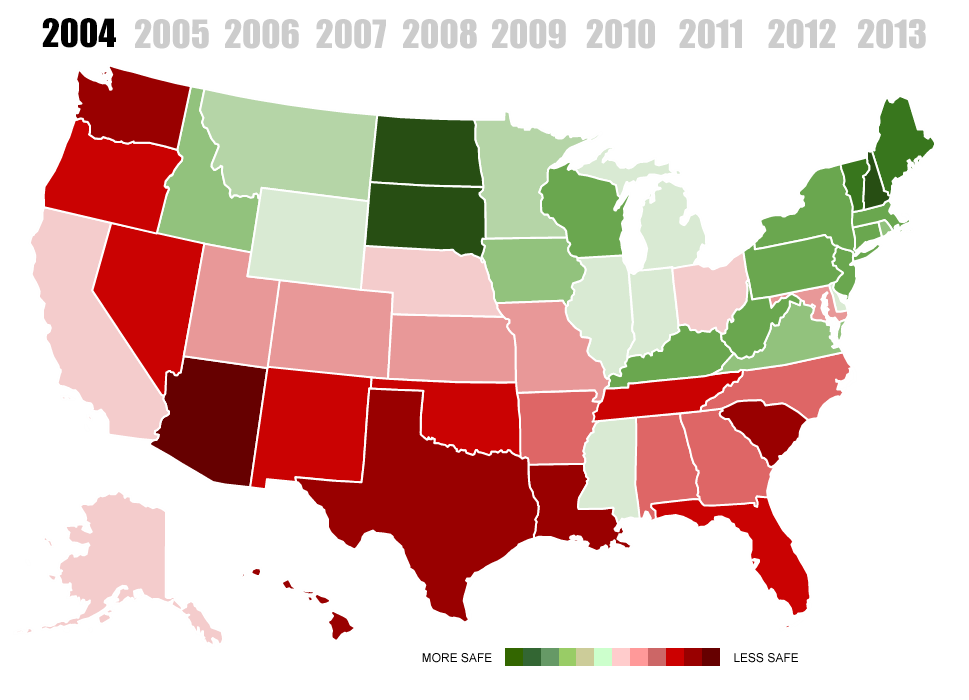


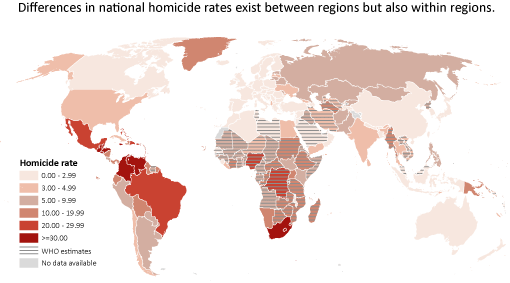
The chart above is from the Global Study on Homicide 2013, conducted by the United Nations Office on Drugs and Crime.


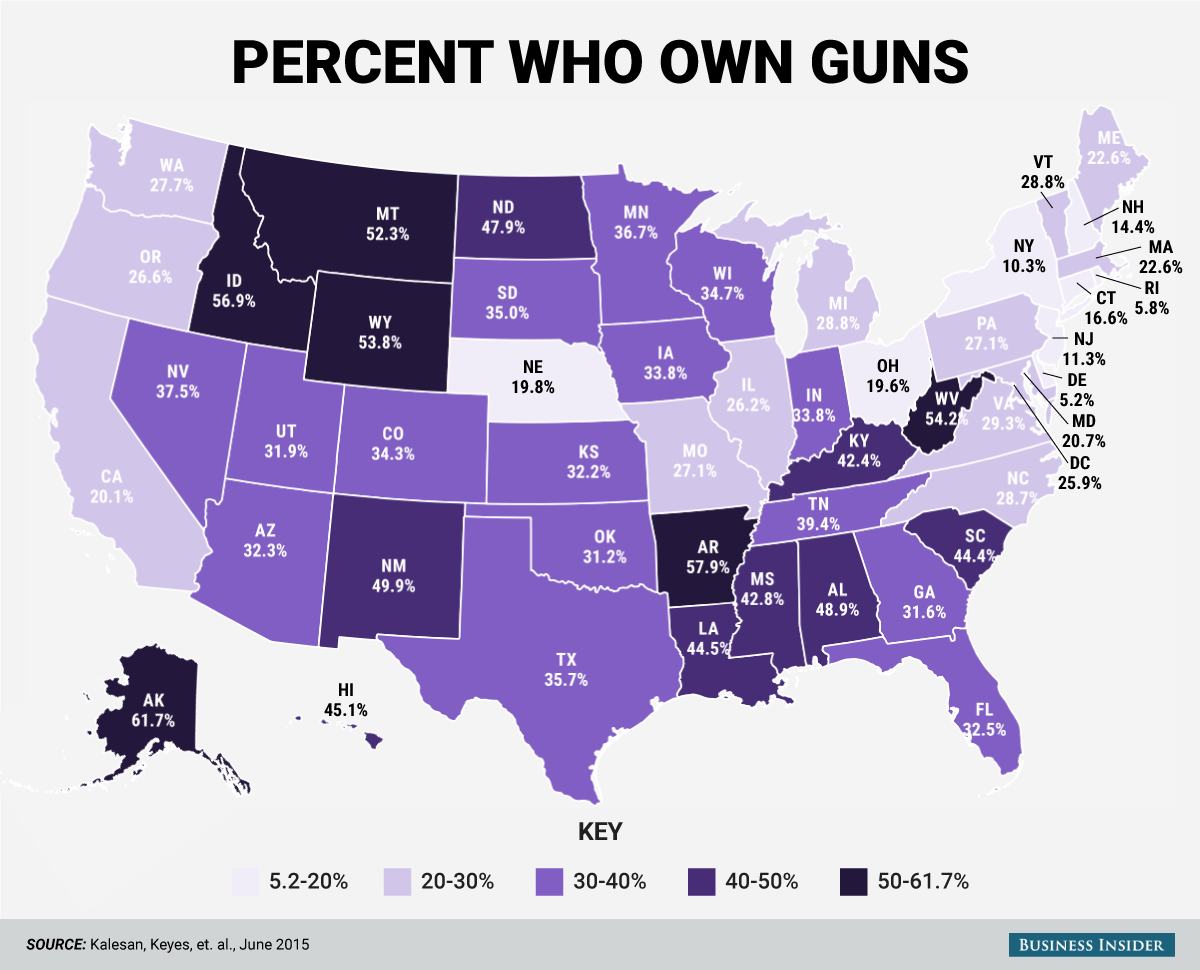


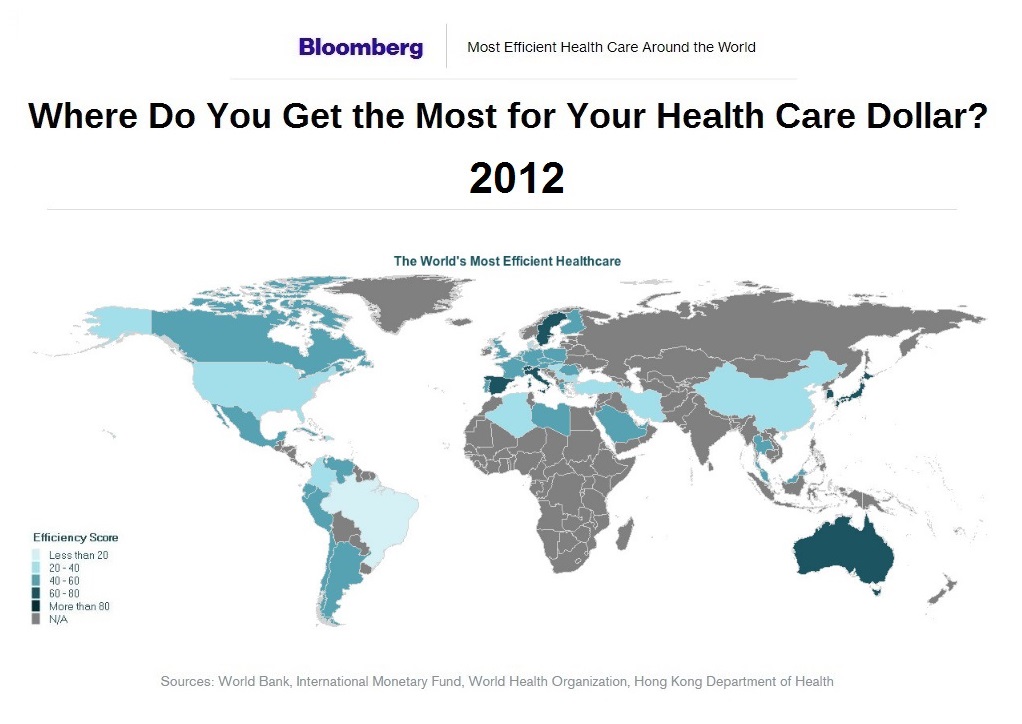


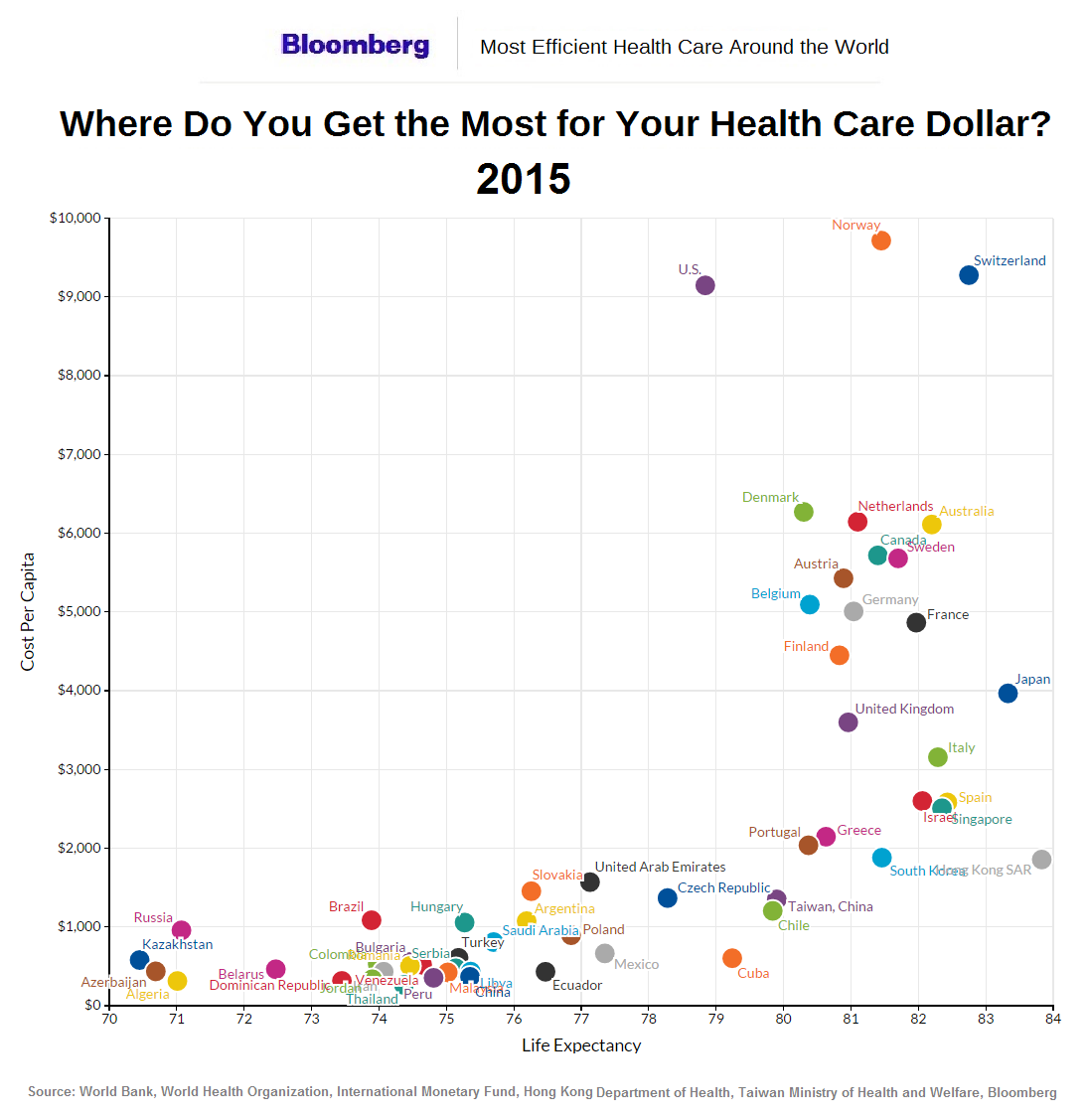







I think that all extremism draws back to the root cause of limited perspective and scope for different interpretations of reality. I think most people don’t have the foundational ability to think beyond their own experiences and life position, and differentiate theirs from the millions of nuances that shape those of others. This results in political viewpoints that are merely reflections of the lives and ways of thinking of the viewer, and aren’t the result of anything objective or reality-based. These viewpoints too unfortunately have no prospect of conceptualizing the world in any other way than as it is and understanding issues themselves or various positions on issues that aren’t directly those of the viewer. This deeply-rooted ignorance manifests itself in many shapes and forms, but ultimately I think most ridiculous and extreme political positions can be explained by this. The thing that personally bothers me about this is that most people cant conceptualize growth – and how we concern ourselves and have ridiculous partisan arguments over trivial problems that would solve themselves if we just aimed all our policies at growth. I think your environmental post hits on this somewhat, anti-environmentalists deny things as simple as climate change and their lack of minimal concern for the earth and environment is patently ludicrous – however environmentalists generally lack an understanding of market principles & capitalist growth, and completely fail to see how controlled and measured growth will allow technology to accelerate at a pace that exceeds environmental decay.
LikeLiked by 1 person
After reading your earlier comment and this one, I can say that we do share very similar viewpoints.
🙂
Have you read “The Righteous Mind: Why Good People Are Divided by Politics and Religion” by Jonathan Haidt? He lays out the latest in psychological studies to explain human behavior in these categories. The final chapter includes findings and a viewpoint that I’ve been espousing for at least a decade and usually got blank stares in response. It’s that one’s political and religious temperament is largely genetic (about 40%). Certainly, our parents, peers, experience, choices and cultural environment have significant roles to play in shaping who and what we become. But, each of those elements is dependent upon and restrained by the physical biology that we’re born with. Like height or eye color, our brains are formed and configured in certain ways that limit, focus, motivate and grow our development in the other categories listed above.
The examples I’ve given are like this:
Can anyone imagine Donald Trump as a touchy-feely poetic mystical grief counselor, in any universe or time period?
How many avant-garde painters or musicians truly pushing society forward in experimental ways have ever been very conservative?
How many seriously gifted professional athletes have an interest or ability in physics or philosophy?
When was there ever a time that a mass movement including a large number of accountants or entrepreneurs gathered together to promote and celebrate far-left ideas like communism or extreme socialism?
How often have you heard a parent say that their child was radically different in disposition and character traits in adulthood compared to early childhood?
The blank slate idea, that we all come from the womb like empty chalkboards ready to be written upon and wet clay to be crafted purely as desired, is less and less tenable as each decade of interdisciplinary research provides more and more evidence against it. Steven Pinker makes this clear in his widely acclaimed book, “The Blank Slate: The Modern Denial of Human Nature”.
The point I’m aiming to make here is that we will never be able to make everyone into political analysts or deep thinkers. Each individual is constrained by their biology which can only be bent and stretched so far. But, a nation of philosophers and intellectuals is not necessary. What’s realistic and needed is for the various talents and sensibilities to be appreciated and integrated into society in productive ways.
The kinds of people that came to America were adventurers, pioneers and generally rugged in comparison with average person of the world. We’ve continued to attract the independent, individualistic, self-made men and women from every country of the world ever since. This has created and sustained a particular genetic pool from which a particular type of person keeps emerging. Of course, the philosophical and religious traditions from Europe have also played a large role – Americans have interpreted these legacies in unique ways that have further molded our national posture toward internal and external opportunities and dilemmas. The geography of the United States has played a determining role as well, since the open land full of challenges had made us self-confident and physical as we felt like conquers when many of us survived while an isolation from Europe and Asia by very large oceans made our national character more libertarian. These are actualities that must be accepted before trying to affect change among what in the American mindset and behavior patterns are truly malleable. We are not France, Denmark or Japan and don’t have the necessary traits to become just like them. We can, however, learn from them and attempt to integrate their best qualities into our habits of thought and action.
At the same time, there are traditions in our history that emphasize more communal and interdependent aspects of society. Our colonial history did, after all, center around distinct and tightly interwoven communities: pre-1776 New England, New York, Pennsylvania and Virginia, to name a few famous examples. We’ve had labor unions and large scale social programs too. There’s a rich variety of precedents to draw from if needed. We’ll likely always be more conservative, religious and libertarian than the other Western nations, yet we should not overlook the fact that the social conditions in many of those societies in many ways are much better than ours and thus we can decide to significantly moderate our extreme tendencies. We can and should do much better. By those metrics, we certainly are not the greatest nation on Earth, as many on the political right, several in the center and some on the left like to say. Instead, it’s more accurate to say that we’re a great nation with many good and bad things on our track record. We can improve if we take the data seriously and humbly adjust accordingly.
LikeLike
I’m actually from Belgium (over 90% secularism btw.!), but I follow US politics pretty closely just out of curiosity. I have to say interesting read though! Good job on explaining your thoughts here, and providing data. Also I’d like to point out that your analysis could be made for the EU as well… I find there are a lot of parallels here.
LikeLike
Hi Arnout. Thanks for the comment. When you say that you see parallels in the EU, do you mean that the more extremely conservative or liberal the nation is the worse the social ills are?
LikeLike
That was a very funny video. 🙂
LikeLiked by 1 person
I think that while you do bring up several good points and there are many things that need to be changed in the United States, you are conflating some substantiated ideas into one somewhat coherent one that fits your narrative, like we all do to an extent. You often seem to imply causation from correlation and don’t realize the impact that history plays. Politics isn’t the cause of everything. The Southern states have generally been poorer from the start and “lost” a lot of their economic power with the Civil War and the ending of slavery (obviously this should have happened because what matters is content of character as MLK, Jr. said). Also realize that Northern states are generally older and also had been gradually getting rid of the practice for a while. And yes, extremist religious beliefs are not preferable and are the cause of some of the negative effects, but I would add that truly moderate religion doesn’t interfere with politics and thus doesn’t have an effect. Also, in comparing immigrants you are comparing current immigration but fail to see that nearly all of current America is immigrants (beyond Native Americans) and a much more valid comparison would be homogeneity of cultures and people. The healthcare industry is tough to explain and I admit to not knowing everything about its implications but I am aware America is for the most part gouged in this market which in some ways allows lower prices in other parts of the world (I do not claim to know how great the effect of this is). Also, it is never almost never a wise idea to get perspective from somebody within a culture and you should take my perspective about America with the same grain of salt as any other person speaking about their country. What matters in this sense is global experience and trying to avoid the filter bubble /confirmation bias so easy to get from the Internet (only hearing similar viewpoints, look this up for more information if unfamiliar with the subject). And yes, I too think the gaps in wealth are too extreme (personally, I believe this is in large part due to crony capitalism and basically regulatory capture, not saying that regulations are bad but they have to be implemented in a manner that takes everything into account) and that there are many things that need to be changed, there are several great parts and things about America as well. I’m from Texas, and I’ve heard about Texas that “If we are not first, we are last” and I think this applies to the nation as a whole in many areas as well. For instance, while student debt is insane and there needs to be some reforms done to education, one also needs to realize there are what I believe to be (on a phone right now so I’m not going to get the most recent statistics) a disproportionate amount of the top universities are in the United States. There are many other sectors neglected that America has going for it, so while I agree much needs to change we don’t need to necessarily throw out the baby with the bathwater and can be more discriminate. Sorry, if this is rambling or anything or has incorrect information but it is just what I have heard and I have learned to try to adjust my understanding based on new information. Also, sorry for not reading the complete post as I probably should be dismissing parts of it somewhat out of hand. For the most part, just trying to give a different perspective since I didn’t see any others here.
LikeLike
Thanks for sharing your perspective, Matthew. I’ll consider what you’ve said.
If extreme conservatism in religion and politics is so beneficial, as its proponents claim is self-evident, then the South should be in a far better position today – more 150 years after the Civil War. Social and religious conservatives have very often been the defenders of racism throughout American history. For example, both the Old and New Testaments clearly teach that slavery is normative.
Related to causation versus correlation, I think that when a very sizable and interdisciplinary group of data accumulates over significant time periods that reveals a similar result, then causation becomes more likely. In the case of what I discussed in the article, there does seem to be a trend occurring. To me, it’s the predictable result of an long-term and excessive focus on hyper-individualism, anti-intellectualism and deregulation. In a lot of ways, Americans are simply less “civilized” than their peers (the other advanced Western nations). Some Americans, often by region and political viewpoint, are less civilized than their fellow citizens, in that they still advocate against important aspects of modern science, the need for universal social programs and the realities of biological and economic interdependence. We all affect each other and cannot escape this. If we can recognize, integrate and implement the best insights from conservatism, liberalism and libertarianism, our living conditions are very likely to improve.
As to geography and my life experience, I was born in Texas, lived in California for 13 years, North Carolina for 1, Alabama for 9 and Georgia for 16.
LikeLike
Reblogged this on BackChannels.
LikeLike
[…] google image search indicates the image was recovered from here. I don’t know it’s origin, and some of the data in it is a little old, but it will do nicely as […]
LikeLike
Reblogged this on Jesus.
LikeLike